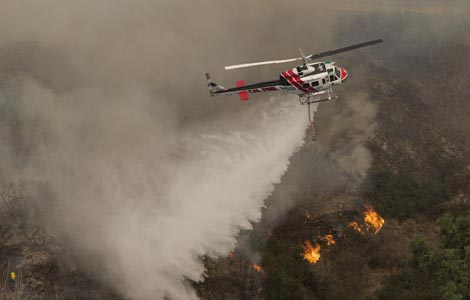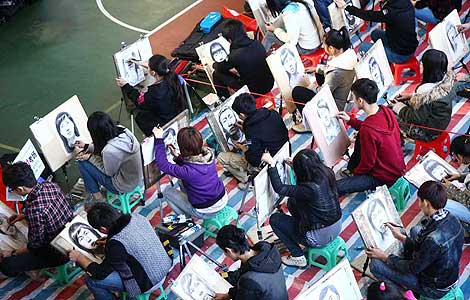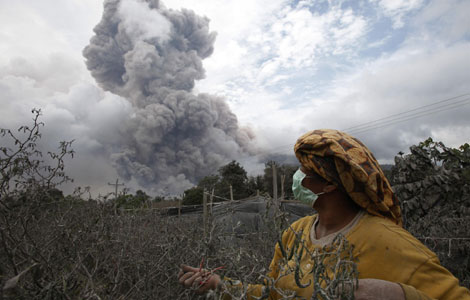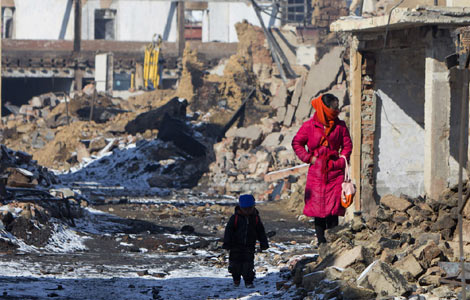Dirty air? Why not wash it?
Updated: 2014-01-17 09:44
By ELIANA KIRSHENBLAT in New York (China Daily USA)
|
||||||||
Some 350,000 to 500,000 premature deaths occur in China every year due to outdoor air pollution, according to a report by 21st Century Business Herald released on Tuesday. New air quality measures are constantly implemented and air pollution reduction targets have recently been set for local governments.
But one researcher may have found a way to simply and drastically reduce the air pollution problem - water China's cities, just like a garden.
Yu Shaocai of Zhejiang University in China, and North Carolina State University in the US, detailed his idea in an article published online Tuesday in Springer's journal Environmental Chemistry Letters. His proposal is straightforward, put a sprinkler system in place that could water China's atmosphere and thus clean it.
In his paper Yu predicts that this method could help reduce the fine particle load in the atmosphere to a safer level of 35 micrograms per cubic meter. And it could be done in a short time, depending how the water is sprayed. He said that the idea came to him "while watching a garden being watered, I immediately thought that we can clean air pollution by spraying water into the atmosphere like watering a garden".
As simple as it sounds, his research backs up the effectiveness of this solution.
The haze in China is caused by fine particles - or particulate matter - that are larger than 2.5 micrometers in diameter, Yu writes in his paper.
Further, "it is well known that precipitation scavenging is the single most efficient way of removing aerosol pollution in the atmosphere".
Precipitation scavenging refers to the natural process when atmospheric moisture like rain, fog or snow removes substances from the air.
Yu cites in his paper research done at a Beijing urban atmospheric environmental monitoring station that shows a marked decrease in air pollution directly after a heavy rainfall, as well as an increase in pollutants during the dry spell directly before the rain.
"When we have rain, especially heavy rain, rainwater can clean the air pollution in a very short time period from a few minutes to hours or days, depending on the precipitation rates," Yu writes.
Spraying water into the atmosphere can result in scavenging air pollution quickly, he writes.
Working with emission control protocols this can be a permanent solution to air quality problems in China's megacities.
Not only is this idea simple but China already has what it needs to make it happen, he argues: Tall buildings to place the sprinklers on, water, aircraft for alternative distribution and sprinklers.
It would also be cost-effective. "The low-tech nature of this geo-engineering approach has led us to believe that it will cost much less than many other interventions, such as cutting emissions," Yu said in his paper. There are even some bonus benefits like removing harmful gases from the atmosphere and cleaning the city's streets.
The drop size also matters so that the drops do not evaporate before hitting the ground, which could release harmful particulates back into the atmosphere. But by ensuring a large enough drop size this can easily be avoided wrote Yu.
"The water could be collected and reused, meaning it would not exacerbate current water shortages," he writes. "If the water collected has been polluted because of very polluted air, then we will need some treatment."
The sprinklers would need to be used daily to avoid the accumulation of air pollution in the atmosphere and the occurrence of haze. Yu is confident that this would not be problem for the public.
"If you can offer a half hour watering your garden, then you can offer a half hour watering your ambient atmosphere to keep air clean," he writes.

 'American Hustle,' 'Gravity' lead Oscar nominations
'American Hustle,' 'Gravity' lead Oscar nominations
 Wildfire out of control in Los Angeles, US
Wildfire out of control in Los Angeles, US
 Way to art school
Way to art school
 'American Hustle,' 'Gravity' lead Oscar nominations
'American Hustle,' 'Gravity' lead Oscar nominations
 138th Westminster Kennel Club Dog Show to open
138th Westminster Kennel Club Dog Show to open
 Volcano displaces thousands in Indonesia
Volcano displaces thousands in Indonesia
 China issues fog alerts
China issues fog alerts
 Stray cats on the way to be slaughtered saved
Stray cats on the way to be slaughtered saved
Most Viewed
Editor's Picks

|

|

|

|

|

|
Today's Top News
He Xiaohui: A visionary rooted inservice
Auto-glass maker invests $200 million for US plant
Consul General lauds progress in 2013
Teaching English in China a good Plan B
China's US debt holdings reach record high
US Treasury chief says high-level engagement 'welcomed'
Asiana firefighters saw victim alive
US 'double standards' threaten other nations
US Weekly

|

|






